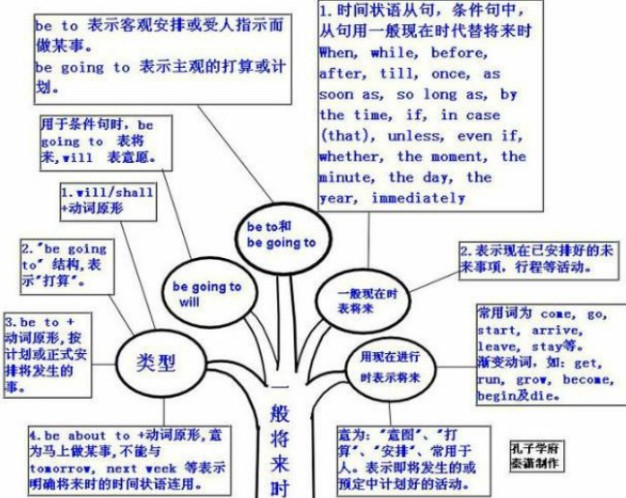本试题 “—How about buying Sam a mobile phone? After all, he isn't a boy any more.—I think it necessary, for we sometimes want to make sure if he home for d...” 主要考查您对一般将来时
等考点的理解。关于这些考点您可以点击下面的选项卡查看详细档案。
- 一般将来时
一般将来时的概念:
一般将来时表示将来某一时刻的发生动作或状态,或将来某一段时间内经常的动作或状态。常与表示将来的时间状语连用。
一般将来时用法:
1)shall用于第一人称,常被will所代替。will在陈述句中用于各人称,在征求意见时常用于第二人称。
例如:Which paragraph shall I read first?我先读哪一段呢?
Will you be at home at seven this evening? 今晚七点回家好吗?
2)be going to+不定式,表示将来。
a. 主语的意图,即将做某事。
例如:What are you going to do tomorrow? 明天打算作什么呢?
b. 计划,安排要发生的事。
例如:The play is going to be produced next month。这出戏下月开播。
c. 有迹象要发生的事。
例如:Look at the dark clouds, there is going to be a storm. 看那乌云,快要下雨了。
3)be+不定式表将来,按计划或正式安排将发生的事。
例如:We are to discuss the report next Saturday. 我们下星期六讨论这份报告。
4)be about to+不定式,意为马上做某事。
例如:He is about to leave for Beijing. 他马上要去北京。
注意:be about to do不能与tomorrow, next week 等表示明确将来时的时间状语连用。
一般将来时知识体系:

一般现在时表将来:
1)下列动词come, go, arrive, leave, start, begin, return的一般现在时可以表示将来,主要用来表示在时间上已确定或安排好的事情。
例如:The train leaves a tsix tomorrow morning. 火车明天上午六点开。
—When does the bus star? 汽车什么时候开?
—It stars in ten minutes. ?十分钟后。
2)以here, there等开始的倒装句,表示动作正在进行。
例如:Here comes the bus.=The bus is coming. 车来了。
There goes the bell.=The bell is ringing. 铃响了。
3)在时间或条件句中。
例如:When Bill comes(不是will come), ask him to wait for me. 比尔来后,让他等我。
I'll write to you as soon as I arrive there. 我到了那里,就写信给你。
4)在动词hope, take carethat,makesurethat等的宾语从句中。
例如:I hope they have a nice time next week. 我希望他们下星期玩得开心。
Make sure that the windows are closed before you leave the room. 离开房间前,务必把窗户关了。
现在进行时表示将来:
下列动词come, go, arrive, leave, start, begin, return等现在进行时可以表示将来。
例如:I'm leaving tomorrow. 明天我要走了。
Are you staying here till next week? 你会在这儿呆到下周吗?
与“—How about buying Sam a mobile phone? After all, he isn't...”考查相似的试题有:
- Rubbish _______ light after this kind of new machine is invented.A.will be made use of givingB.will make use of to ...
- —Dad, I don’t think Oliver the right sort of person for the job.—I see. I’ll go right away and ________.A.pay him ba...
- - Did you tell Julia about the result?- Oh, no, I forgot. I _____ her now.[ ]A. will be callingB. will callC. callD...
- Most people take clean water for granted, but we ________ any if we don't stop polluting the rivers andlakes.[ ]A.do...
- In such a fierce competition, a person has to make every effort if he________.[ ]A. has succeededB. is to succeedC. w...
- If we ______ develop the world successfully, we must make sure that everyone is able to take partin the new world we ...
- I think it is necessary for my 19-year-old son to have his own mobile phone, for Isometimes want to make sure if he_...
- —Lucy has gone to China for her holiday.—Really?When________back?[ ]A. is she comingB. did she comeC. had she comeD. ...
- If Bob's wife doesn't agree to sign the papers; ________.[ ]A. neither does heB. neither won't heC. neither will heD....
- — Kate is in hospital.— Oh, really? I ______. ______ visit her.A. don't know, I'll goB. don't know, I'll go andC. did...